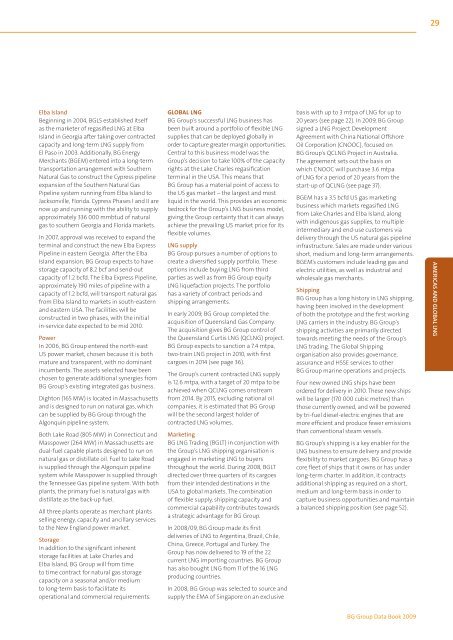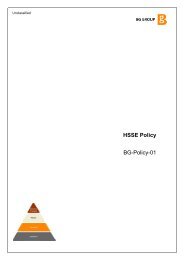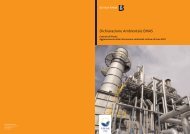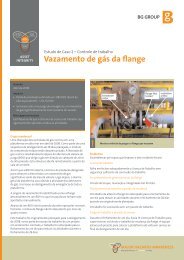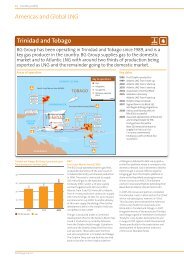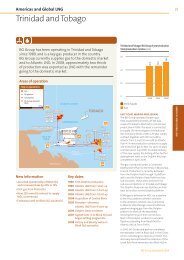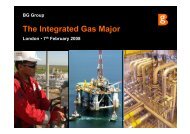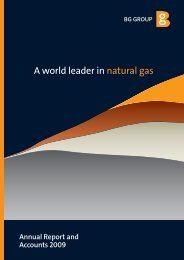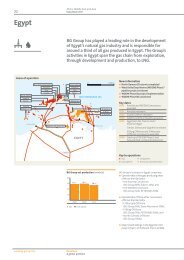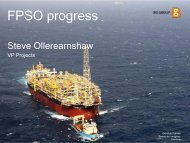download - BG Group
download - BG Group
download - BG Group
Create successful ePaper yourself
Turn your PDF publications into a flip-book with our unique Google optimized e-Paper software.
Elba Island<br />
Beginning in 2004, <strong>BG</strong>LS established itself<br />
as the marketer of regasified LNG at Elba<br />
Island in Georgia after taking over contracted<br />
capacity and long-term LNG supply from<br />
El Paso in 2003. Additionally, <strong>BG</strong> Energy<br />
Merchants (<strong>BG</strong>EM) entered into a long-term<br />
transportation arrangement with Southern<br />
Natural Gas to construct the Cypress pipeline<br />
expansion of the Southern Natural Gas<br />
Pipeline system running from Elba Island to<br />
Jacksonville, Florida. Cypress Phases I and II are<br />
now up and running with the ability to supply<br />
approximately 336 000 mmbtud of natural<br />
gas to southern Georgia and Florida markets.<br />
In 2007, approval was received to expand the<br />
terminal and construct the new Elba Express<br />
Pipeline in eastern Georgia. After the Elba<br />
Island expansion, <strong>BG</strong> <strong>Group</strong> expects to have<br />
storage capacity of 8.2 bcf and send-out<br />
capacity of 1.2 bcfd. The Elba Express Pipeline,<br />
approximately 190 miles of pipeline with a<br />
capacity of 1.2 bcfd, will transport natural gas<br />
from Elba Island to markets in south-eastern<br />
and eastern USA. The facilities will be<br />
constructed in two phases, with the initial<br />
in-service date expected to be mid 2010.<br />
Power<br />
In 2006, <strong>BG</strong> <strong>Group</strong> entered the north-east<br />
US power market, chosen because it is both<br />
mature and transparent, with no dominant<br />
incumbents. The assets selected have been<br />
chosen to generate additional synergies from<br />
<strong>BG</strong> <strong>Group</strong>’s existing integrated gas business.<br />
Dighton (165 MW) is located in Massachusetts<br />
and is designed to run on natural gas, which<br />
can be supplied by <strong>BG</strong> <strong>Group</strong> through the<br />
Algonquin pipeline system.<br />
Both Lake Road (805 MW) in Connecticut and<br />
Masspower (264 MW) in Massachusetts are<br />
dual-fuel capable plants designed to run on<br />
natural gas or distillate oil. Fuel to Lake Road<br />
is supplied through the Algonquin pipeline<br />
system while Masspower is supplied through<br />
the Tennessee Gas pipeline system. With both<br />
plants, the primary fuel is natural gas with<br />
distillate as the back-up fuel.<br />
All three plants operate as merchant plants<br />
selling energy, capacity and ancillary services<br />
to the New England power market.<br />
Storage<br />
In addition to the significant inherent<br />
storage facilities at Lake Charles and<br />
Elba Island, <strong>BG</strong> <strong>Group</strong> will from time<br />
to time contract for natural gas storage<br />
capacity on a seasonal and/or medium<br />
to long-term basis to facilitate its<br />
operational and commercial requirements.<br />
GLOBAL LNG<br />
<strong>BG</strong> <strong>Group</strong>’s successful LNG business has<br />
been built around a portfolio of flexible LNG<br />
supplies that can be deployed globally in<br />
order to capture greater margin opportunities.<br />
Central to this business model was the<br />
<strong>Group</strong>’s decision to take 100% of the capacity<br />
rights at the Lake Charles regasification<br />
terminal in the USA. This means that<br />
<strong>BG</strong> <strong>Group</strong> has a material point of access to<br />
the US gas market – the largest and most<br />
liquid in the world. This provides an economic<br />
bedrock for the <strong>Group</strong>’s LNG business model,<br />
giving the <strong>Group</strong> certainty that it can always<br />
achieve the prevailing US market price for its<br />
flexible volumes.<br />
LNG supply<br />
<strong>BG</strong> <strong>Group</strong> pursues a number of options to<br />
create a diversified supply portfolio. These<br />
options include buying LNG from third<br />
parties as well as from <strong>BG</strong> <strong>Group</strong> equity<br />
LNG liquefaction projects. The portfolio<br />
has a variety of contract periods and<br />
shipping arrangements.<br />
In early 2009, <strong>BG</strong> <strong>Group</strong> completed the<br />
acquisition of Queensland Gas Company.<br />
The acquisition gives <strong>BG</strong> <strong>Group</strong> control of<br />
the Queensland Curtis LNG (QCLNG) project.<br />
<strong>BG</strong> <strong>Group</strong> expects to sanction a 7.4 mtpa,<br />
two-train LNG project in 2010, with first<br />
cargoes in 2014 (see page 36).<br />
The <strong>Group</strong>’s current contracted LNG supply<br />
is 12.6 mtpa, with a target of 20 mtpa to be<br />
achieved when QCLNG comes onstream<br />
from 2014. By 2015, excluding national oil<br />
companies, it is estimated that <strong>BG</strong> <strong>Group</strong><br />
will be the second largest holder of<br />
contracted LNG volumes.<br />
Marketing<br />
<strong>BG</strong> LNG Trading (<strong>BG</strong>LT) in conjunction with<br />
the <strong>Group</strong>’s LNG shipping organisation is<br />
engaged in marketing LNG to buyers<br />
throughout the world. During 2008, <strong>BG</strong>LT<br />
directed over three quarters of its cargoes<br />
from their intended destinations in the<br />
USA to global markets. The combination<br />
of flexible supply, shipping capacity and<br />
commercial capability contributes towards<br />
a strategic advantage for <strong>BG</strong> <strong>Group</strong>.<br />
In 2008/09, <strong>BG</strong> <strong>Group</strong> made its first<br />
deliveries of LNG to Argentina, Brazil, Chile,<br />
China, Greece, Portugal and Turkey. The<br />
<strong>Group</strong> has now delivered to 19 of the 22<br />
current LNG importing countries. <strong>BG</strong> <strong>Group</strong><br />
has also bought LNG from 11 of the 16 LNG<br />
producing countries.<br />
In 2008, <strong>BG</strong> <strong>Group</strong> was selected to source and<br />
supply the EMA of Singapore on an exclusive<br />
basis with up to 3 mtpa of LNG for up to<br />
20 years (see page 22). In 2009, <strong>BG</strong> <strong>Group</strong><br />
signed a LNG Project Development<br />
Agreement with China National Offshore<br />
Oil Corporation (CNOOC), focused on<br />
<strong>BG</strong> <strong>Group</strong>’s QCLNG Project in Australia.<br />
The agreement sets out the basis on<br />
which CNOOC will purchase 3.6 mtpa<br />
of LNG for a period of 20 years from the<br />
start-up of QCLNG (see page 37).<br />
<strong>BG</strong>EM has a 3.5 bcfd US gas marketing<br />
business which markets regasified LNG<br />
from Lake Charles and Elba Island, along<br />
with indigenous gas supplies, to multiple<br />
intermediary and end-use customers via<br />
delivery through the US natural gas pipeline<br />
infrastructure. Sales are made under various<br />
short, medium and long-term arrangements.<br />
<strong>BG</strong>EM’s customers include leading gas and<br />
electric utilities, as well as industrial and<br />
wholesale gas merchants.<br />
Shipping<br />
<strong>BG</strong> <strong>Group</strong> has a long history in LNG shipping,<br />
having been involved in the development<br />
of both the prototype and the first working<br />
LNG carriers in the industry. <strong>BG</strong> <strong>Group</strong>’s<br />
shipping activities are primarily directed<br />
towards meeting the needs of the <strong>Group</strong>’s<br />
LNG trading. The Global Shipping<br />
organisation also provides governance,<br />
assurance and HSSE services to other<br />
<strong>BG</strong> <strong>Group</strong> marine operations and projects.<br />
Four new owned LNG ships have been<br />
ordered for delivery in 2010. These new ships<br />
will be larger (170 000 cubic metres) than<br />
those currently owned, and will be powered<br />
by tri-fuel diesel-electric engines that are<br />
more efficient and produce fewer emissions<br />
than conventional steam vessels.<br />
<strong>BG</strong> <strong>Group</strong>’s shipping is a key enabler for the<br />
LNG business to ensure delivery and provide<br />
flexibility to market cargoes. <strong>BG</strong> <strong>Group</strong> has a<br />
core fleet of ships that it owns or has under<br />
long-term charter. In addition, it contracts<br />
additional shipping as required on a short,<br />
medium and long-term basis in order to<br />
capture business opportunities and maintain<br />
a balanced shipping position (see page 52).<br />
<strong>BG</strong> <strong>Group</strong> Data Book 2009<br />
29<br />
AMERICAS AND GLOBAL LNG


